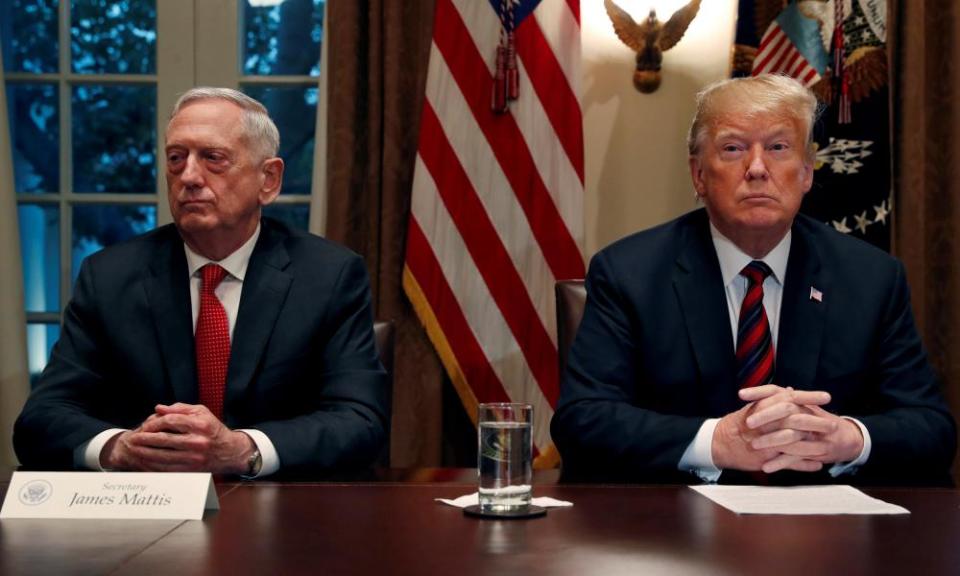Why did Mattis resign? To issue a wake-up call to the world
It’s difficult not to respect what the defense secretary did: go public with his grave concerns about the danger Trump poses to the country and world

James Mattis just shattered the glass you only break in case of emergency.
The US secretary of defense resigned in protest over the president of the United States actively undermining “an international order that is most conducive to our security, prosperity and values”.
You don’t have to like Mattis or agree with his policies or sweep under the rug all of the times he didn’t resign when Donald Trump did something truly abhorrent. But it’s difficult not to respect that he just had the courage to do what no one else in the Trump administration has done – resign in protest and go public with his grave concerns about the danger that Trump poses to the country and the world.
That Trump is dangerous has been clear to anyone who has listened to him since the moment he descended the escalators at Trump Tower in 2015 to announce his candidacy. And Trump’s worldview – disdain for democratic allies, embrace of autocrats, and opposition to America’s role in the post-war world – has also long been clear. But the fact that Trump’s current Defense secretary felt the need to resign and let the world know about his deep-seaed concerns about the president is an unprecedented event in an unprecedented presidency.
Mattis’s letter – which was distributed to the press when he resigned – ends with a stunning rebuke of Trump: “Because you have the right to a secretary of defense whose views are better aligned with yours on these and other subjects, I believe it is right for me to step down from my position.”
Translation: Mattis doesn’t agree with Trump’s foreign policy.
Mattis explained which of his views aren’t “better aligned” with Trump.
“While the US remains the indispensable nation in the free world, we cannot protect our interests or serve that role effectively without maintaining strong alliances and showing respect to those allies,” Mattis wrote.
Translation: Mattis believes that Trump treats America’s closest allies with derision, which endangers America’s national security and its interests around the world.
“Similarly,” Mattis wrote, “I believe we must be resolute and unambiguous in our approach to those countries whose strategic interests are increasingly in tension with ours,” naming Russia and China in particular.
Translation: Trump is weak and erratic in his policies towards America’s greatest rivals, including Russia and China.
Mattis closed by saying: “My views on treating allies with respect and also being clear-eyed about both malign actors and strategic competitors are strongly held and informed by over four decades of immersion in these issues.”
Translation: Trump has no idea what he’s doing.
It is well known that Mattis had numerous policy agreements with Trump. When Trump talked of war with North Korea, Mattis talked of the horrors that war would bring. When Trump withdrew America from the Iran nuclear deal, Mattis reportedly opposed the move. And Trump’s decisions to withdraw American troops from Syria – and now it seems Afghanistan as well – may have been the final straws that forced Mattis’s resignation.
Policy disagreements are normal and can be healthy in a functional administration. But this administration is anything but functional, and the depth of Mattis’ concerns with Trump are anything but normal. Mattis’ resignation should be a uniquely clear wake-up call amid daily wake-up calls about the danger that Trump poses.
So, what does it mean?
Will Mattis’ replacement at the defense department be worse? Possibly.
Will Trump feel less constrained in pursuing reckless foreign policy decisions? Probably.
Are the wheels coming off the bus? Maybe. Though it doesn’t seem like the bus ever had any wheels.
This administration is anything but functional, and the depth of Mattis’ concerns with Trump are anything but normal
Agree or disagree with Mattis on specific policies, the world he has worked to build – that America has worked to build – is under stress. China is placing strains on global economic and security norms. Russia is becoming more aggressive, destabilizing parts of Europe and the Middle East. And America’s democratic allies in Europe are struggling.
Trump is exacerbating all of these trends. His erratic policies on China are ineffective. His unwillingness to stand up to Russia is giving Putin a green light for more belligerence. Trump is eroding America’s alliances, forcing them to push back against America. And all of this is undermining the structures of global stability that have prevented great power conflict for decades.
While there is much Mattis should not be proud of – sending troops to the border with Mexico as part of an election campaign show, not speaking out or resigning when Trump stood up for white supremacists at Charlottesville, attacked the FBI or the press, or did any number of things that undermine American democracy and security – Mattis can be proud of taking a stand now. One can only hope that this is the first – not the last – that the world hears from Mattis about Trump.
And for the sake of America and the world, one can only hope that other members of Trump’s party begin to speak out and act to restrain a president they all know is completely unfit for office.

